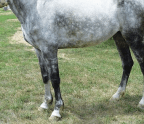
Head off dehydration by adopting these four habits
You’re probably familiar with the skin-pinch test for dehydration. It’s simple to do: Grab a fold of skin at the point of your horse’s shoulder and pull it away from his body. Release the skin and count how long it takes for it to flat-ten. If it takes longer than two seconds, your horse is dehydrated.
While the skin-pinch test is useful, it is a late-stage indicator of a problem. By the time skin doesn’t snap back, the horse is already feeling pretty lousy due to dehydration. He’s also at immediate risk of colic and muscle damage. It’s far better to prevent a horse from getting de-hydrated in the first place.
To ensure your horse




